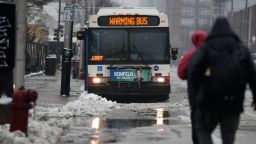A charter bus company hired by the state of Texas to transport migrants to Chicago is trying to flip the script on the border crisis in a federal lawsuit against the city alleging that its ordinance banning unannounced migrant drop-offs is unconstitutional and punishes transportation companies working with Texas, court documents show.
Wynne Transportation LLC is fighting new restrictions in Chicago against buses dropping off one-way passengers without prior notice.
The ordinance does not specifically mention immigration, but city leaders have acknowledged it is in response to the influx of more than 30,000 migrants arriving from Texas on government-contracted charter buses, often dropped off on street corners with little or no notice.
The rules, enacted on December 8 in an effort to slow the surge, require unscheduled one-way buses from outside the Chicago area to get advance approval from the city to drop people off. Violators can be fined $3,000 and have their vehicles impounded, the mandate says.
“Texas bus operators continue to willfully break the law by disregarding regulations designed to ensure the safety of asylum seekers arriving in Chicago,” Mayor Brandon Johnson’s office said in a December news release calling for federal support in addressing the migrant crisis.
At the direction of Republican Gov. Greg Abbott, the Lone Star state has bused over 90,000 migrants to “sanctuary cities” run by Democratic elected officials including New York, Washington, DC, Chicago, Philadelphia, Denver and Los Angeles since April 2022, according to numbers released by the governor’s office December 29.
“Wynne is taking action against the City’s ordinance because it unlawfully interferes with its business and violates Wynne’s constitutional rights and the rights of Wynne’s passengers,” Michael Kozlowski, an attorney representing Wynne Transportation LLC and several other charter bus companies, told CNN in a statement Thursday.
In its lawsuit, Wynne Transportation LLC, which is also caught in the middle of another lawsuit filed in the New York Supreme Court for its non-compliant role in transporting migrants to New York City, argues that the ordinance is intended to limit the flow of immigrants and infringes on the right of the federal government to set immigration policy.
“This case is about allowing immigrants the opportunity to call Chicago home,” the lawsuit states.
CNN reached out to the City of Chicago for comment. It has not yet filed a response to the suit in court, and no hearing dates have been set in the case.
As of December 31, Chicago filed 95 separate lawsuits against approximately 24 bus companies to enforce the unlawful ordinance, Kozlowski said.
“We intend to vigorously defend those cases,” he said, which will begin on January 29 when an initial hearing for 40 of the 95 cases filed by the city will take place, Kozlowski said.
At the same time that the bus company cites federal immigration authority in its suit, the state of Texas is involved in ongoing litigation with the Biden administration over its efforts to arrest migrants, place barriers in the Rio Grande and block Border Patrol agents from access to parts of the border.
The Wynne lawsuit argues Chicago is also violating the constitutional authority of the federal government to regulate interstate commerce by enacting restrictions that mostly apply to out-of-state companies.
“The Ordinance violates both Plaintiff’s and its passengers’ fundamental right of free movement/interstate travel,” the documents state.






